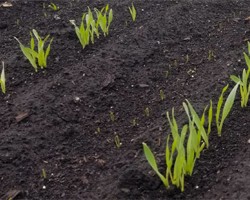Seed Treatments to Manage Maggots and Soilborne Diseases in Onion, 2026
Christy Hoepting, Extension Vegetable Specialist
Cornell Vegetable Program

Because onions are attacked by the onion maggot (Delia antiqua) and seedcorn maggot (D. platura), determining which insecticide seed treatments to use for managing both is important. Our recent research has shown that seedcorn maggot may kill onion seedlings before and shortly after emergence, while onion maggot is the dominant species that kills onions after emergence (80-90% of infested plants), and seedcorn maggot is less prevalent (10-20% of plants).
The "Cheat Sheet" for Seed Treatment and In-Furrow Treatments for Managing Maggots and Soilborne Diseases in Direct-Seeded Onion in New York, 2026 provides an update on insecticide options for managing both maggot species using seed treatments based on results from multiple Cornell field trials in Oswego County from 2023 to 2025.
Cheat Sheet for Seed Treatments to Manage Maggots and Soilborne Diseases in Onion, 2026 (pdf; 259KB)

Upcoming Events
Orleans Regional Winter Vegetable Meeting
February 9, 2026
Albion, NY
Topics include: Breeding and evaluating tomatoes to control disease and improve yield, jar testing and ensuring spray water quality, breaking down organic matter, FSMA updates and Q&A with Ag & Markets, and industry updates. Includes hands-on learning, coffee break, and sponsor booths.
DEC credits available: 1.0 in CORE plus 0.5 in 1a, 10 or 23
African Eggplant Participatory Breeding Kick-Off
March 5, 2026
Join us to learn about the Cornell African Eggplant Research Project and learn how you can participate! African eggplant, also known as Bitterball, Garden Egg, Kittley and other names, is an important crop for many members of our community with heritage from regions such as sub-Saharan Africa, Southeast Asia, and Brazil. Since 2024, the Cornell African Eggplant Research Project has been collaborating with growers and community partners across New York to develop high-quality varieties adapted to the Northeast U.S. In this meeting, we will share information about growing and preparing African eggplant, highlight our research to date, and invite partners to collaborate with us in our 2026 participatory breeding and variety selection efforts.
COST: FREE! You must pre-register to receive the Zoom link.
Managing the Invasive Swede Midge Webinar
March 6, 2026
Swede midge is an invasive fly that causes serious economic losses to brassica crops. Due to its small size and hidden feeding habits, swede midge is often called an "invisible pest" and damage may be misdiagnosed. In this webinar, we will review the swede midge life cycle and crop damage symptoms, current management recommendations, new research findings, and highlights from on-farm case studies with a focus on organic management.
1.75 DEC pesticide recertification credits in categories 1a, 10, and 23.


































